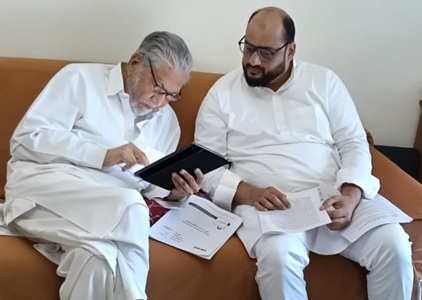New Delhi:(IANS) Research and Development (R&D) and small and medium enterprises (SMEs) can drive India’s defence modernisation and fetch the government’s additional taxes, says the head of India’s only manufacturer of locally-developed aircraft simulators and a jointly-crafted helicopter simulator.
Towards this end, an indigenously designed and developed category should be included in the Buy Indian section of the Defence Procurement Policy, a revised draft of which has just been submitted, said Ashok Atluri, chairman and managing director of Zen Technologies, which has supplied over 450 simulators to more than 100 customers across all the three services, state and central police forces of India and other countries.
“The heart of any weaponry and related system is the technology, the software and the algorithms that run the system. The metal around the technology is dumb. Where Indian companies develop technology that meets the requirements of the Indian forces, these products should be bought from that company at the same international prices (as per standard benchmarking done now) at which they would have been procured from foreign companies,” Atluri told IANS during a visit here.
This should be done even if it is a single vendor situation, “which is more than likely as there is only one customer – the Indian armed forces,” he added. A positive side effect of this, he said, was that almost 30 percent of the profits that the Indian companies make “will come back as income tax”.
If an Indian company has developed the technology, then it will be spending significant amounts of money in R&D — 10 to 20 percent of the revenues will go back into R&D which will help the company evolve existing products and develop newer defence products, he noted.
“This policy will attract talent and ensure that lots of Indian companies get into R&D for military purposes. With so much to gain from buying products that are developed indigenously, it is strange that there is no provision, as on date, to give preference to indigenously developed technology,” Atluri said.
Pointing to his own company, he said it reinvests more than 40 percent of its revenue into the R&D division.
“For example, last year on a turnover of Rs.49 crore ($7.5 million), we invested Rs.20 crore on R&D. Additionally out of 245 employees, about 97 work in the R&D department. Again, approximately 40 percent of our human capital is invested in the R&D department,” he said.
For the company, he said, product development is a continuous process and R&D “helps us in improving and refining our product portfolio. Zen also has an impressive list of patents. Furthermore the company’s R&D unit has been recognized & accredited by the Department of Scientific and Industrial Research of the Ministry of Science and Technology.
As for SMEs, Atluri described them as “hubs for creativity and innovation”, adding: “If we really want to design and develop new defence products and make India a global supplier of such products, SMEs are our only hope.”
Pitching the market in the next five years at more than Rs.6,00,000 crore, he said opportunities “are both in terms of being part of a supply chain of a product or making the complete product”.
In this context, he suggested SMEs develop, by themselves or by forming a consortium, complete products and bid for them directly with the armed forces.
“This will ensure that the value is captured by SMEs instead of the so-called ‘integrators’. The benefit of such business going to smaller companies is that they reinvest such earnings into more R&D to evolve better products and the country benefits. This will also aid in our country’s vision to be a global supplier for defence rather than carry the ignominy of being world’s largest importer of defence goods,” Atluri maintained.
Incorporated in 1993, Zen Technologies has over the years designed, developed and manufactured various types of training equipment and simulators. With Rockwell Collins, it unveiled at the Aero India trade expo a next generation rotary wing simulator that it said signalled it had “arrived”.
(Vishnu Makhijani can be contacted at vishnu.makhijani@ians.in)






0 Comments